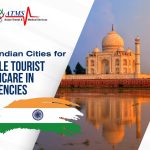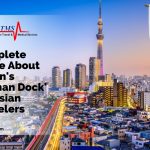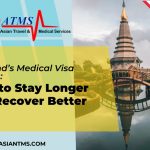
Traveling in Japan may be a dream come true—until the unexpected happens. A healing emergency in a different country is daunting enough, but when you don’t speak the language, it is even more stressful.
At ATMS – Asian Travel & Medical Services, we undertake bridging this ideas gap. Whether you’re a tourist, a student, or an expat, our mission is to guarantee you can receive the crisis care you want in Japan—fast, safely, and positively, even though you don’t speak Japanese. You can get our emergency medical services in Japan for more advice.
In this guide, we’ll walk you through by what method to handle healing crises in Japan, what challenges to address, and how we at ATMS can support you each step of the way.
The Reality of Medical Emergencies in Japan for Foreigners
Japan has individual of the world’s most adept and advanced healthcare methods. Hospitals are clean, modern, and staffed accompanying skilled experts. But despite all this, vocabulary remains an important hurdle, especially during crises.
Common challenges include:
- Difficulty describing symptoms precisely
- Understanding what tests or treatments are being presented
- Not knowing hospital processes or expectations
- Trouble enlarging admission forms
- Being doubtful of payment and security processes
In emergencies, these challenges can delay care or bring about miscommunication. That’s reason preparation and professional support are essential.
Understanding Japan’s Emergency Medical System
To act fast, you need to understand in what way or manner the system everything.
Facts about Emergency in Japan
• Ambulance Services:
Free to use, but hospital care is not.
• Hospital Access:
Not all hospital accepts emergency walk-ins.
• Triage Process:
Ambulance staff determine the ultimate appropriate hospital, not the patient.
• Language Barrier:
Most workers in hospitals do not know English.
• Payment:
Expect to pay upfront, except that insurance plans are made earlier.
At ATMS, we work closely accompanying local hospitals and hospitals to ensure you’re supervised to a facility that can sustain your needs and provide English support wherever possible. Our medical repatriation services provider in Japan is always there to help you.
What to Do During a Medical Emergency in Japan
1. Call Emergency Number
Keep calm and try to describe the crisis as simply as possible. If you’re not confident, request someone nearby to help you call.
2. Use Your Phone for Translation
Simple interpretation apps can help convey your condition or syndromes. Avoid using complex medical conditions.
3. Contact ATMS Immediately
We can guide you remotely, address ambulance or clinic staff on your side, and help coordinate care.
4. Bring Identification
Always have a copy of your passport, travel protection card, and some medical history documents ready.
5. Ask for Written Explanations
If the entity isn’t clear, request written facts or ask for visuals—many nursing homes have multilingual diagrams.
How ATMS Supports You During a Medical Crisis
We’ve backed thousands of worldwide patients through critical healing moments in Japan. Whether it’s food poisoning, injury, hypersensitive reactions, or unexpected illness, we’re on welcome coordinate, interpret, and advocate for you.
Here’s how we help:
• 24/7 Emergency Coordination
We guide you step-by-step through the crisis process, from ambulance dispatch to clinic admission and further.
• Hospital Navigation
We connect you with accompanying hospitals popular for accepting different patients, and even pre-alert them of your arrival.
• Communication Support
We also provide communication support to our customers when needed.
• Aftercare and Follow-up
We don’t stop at danger treatment—we continue to back you through follow-up appointments and recovery.
What to Prepare Before a Medical Emergency
Preparation can make all the difference. Even if you’re healthy, it pays to be ready to avoid the unexpected from happening.
Your Medical Emergency Checklist:
- Take your visa and passport safely.
- Maintain a brief record of what happened, summary (conditions, allergies, drugs).
- Know your blood type and some major strength risks.
- Download a basic interpretation app with an offline approach.
- Save ATMS’ emergency contact analyses in your phone.
- Learn the location of the nearest ward or clinic near your reconciliation.
Our Medical Assistance provider in Japan also offers healing emergency cards that you can transfer while traveling, accompanying your essential information, and our 24/7 hotline.
Cultural Considerations in Japanese Healthcare
Japan’s healthcare civilization values courtesy, discretion, and process. This may feel strange in an emergency place time is for fault-finding.
- Staff may be uncertain to speak English even though they can.
- You may be required to follow the correct registration processes in this situation.
- It’s common to wait, even in crisis rooms, if your case is not life-threatening.
- Direct and touching communication can be misunderstood—calm and clear requests work best.
This is where ATMS can become involved, helping you express importance and importance without cultural misunderstandings.
When You Can’t Speak the Language, We Speak for You
At ATMS, we believe the fear of covering a medical emergency in a place where you can’t explain what’s wrong. So we make sure that you will never feel alone when you are abroad. We also work as your translator when you face any language problems.
Contact us
Japan offers marvellous healthcare, but navigating dangers without speaking the language may be overwhelming. That’s why preparation, knowledge, and expert support are your best tools.
ATMS – Asian Travel & Medical Services provider in Japan is present to help you through every step of a healing emergency. Whether it’s a minor occurrence or a life-threatening occurrence, we’re on call to assist you—anytime, anyplace. Call our 24/7 emergency hotline or contact us via our site.



